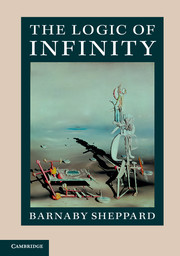Book contents
- Frontmatter
- Contents
- Preface
- Synopsis
- 1 Introduction
- 2 Logical foundations
- 3 Avoiding Russell's paradox
- 4 Further axioms
- 5 Relations and order
- 6 Ordinal numbers and the Axiom of Infinity
- 7 Infinite arithmetic
- 8 Cardinal numbers
- 9 The Axiom of Choice and the Continuum Hypothesis
- 10 Models
- 11 From Gödel to Cohen
- A Peano Arithmetic
- B Zermelo–Fraenkel set theory
- C Gödel's Incompleteness Theorems
- Bibliography
- Index
9 - The Axiom of Choice and the Continuum Hypothesis
Published online by Cambridge University Press: 05 August 2014
- Frontmatter
- Contents
- Preface
- Synopsis
- 1 Introduction
- 2 Logical foundations
- 3 Avoiding Russell's paradox
- 4 Further axioms
- 5 Relations and order
- 6 Ordinal numbers and the Axiom of Infinity
- 7 Infinite arithmetic
- 8 Cardinal numbers
- 9 The Axiom of Choice and the Continuum Hypothesis
- 10 Models
- 11 From Gödel to Cohen
- A Peano Arithmetic
- B Zermelo–Fraenkel set theory
- C Gödel's Incompleteness Theorems
- Bibliography
- Index
Summary
The Axiom of Choice
Zermelo regards the axiom as an unquestionable truth. It must be confessed that, until he made it explicit, mathematicians had used it without a qualm; but it would seem that they had done so unconsciously. And the credit due to Zermelo for having made it explicit is entirely independent of the question whether it is true or false.
–Bertrand RussellStrong versus weak Choice
The Axiom of Choice is one of the most interesting and most discussed axioms to have emerged in mathematics since the status of Euclid's parallel postulate was resolved in the mid-nineteenth century. The question of whether it should be adopted as one of the standard axioms of set theory was the cause of more philosophical debate among mathematicians in the twentieth century than any other question in the foundations of mathematics.
Axiom of Choice
For every set a there exists a function f such that, for all x ∈ a, if x ≠ Ø then f(x) ∈ x.
The function f is called a choice function; it selects exactly one element from each set in a. Choice functions had been used without full recognition by Cantor and others long before Zermelo distilled the idea.
A much stronger form of Choice asserts that there is a universal choice function, that is, a function F such that, for all sets x, if x ≠ Ø then F(x) ∈ x.
Information
- Type
- Chapter
- Information
- The Logic of Infinity , pp. 335 - 364Publisher: Cambridge University PressPrint publication year: 2014
